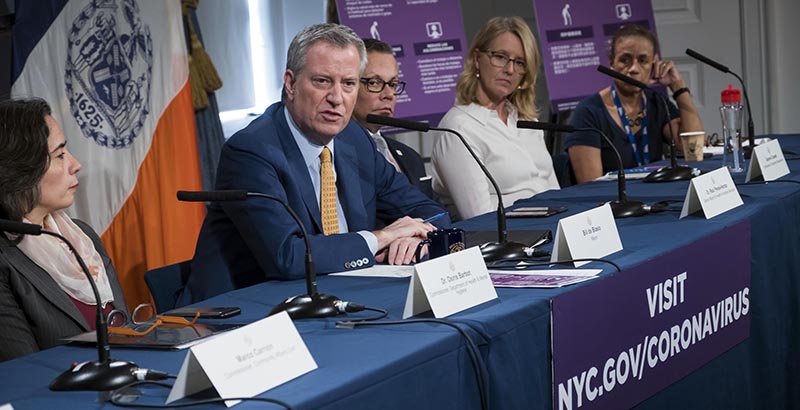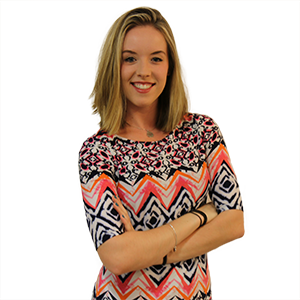As Mayor Faced Growing Pressure to Close NYC Schools, a Smaller-Scale Change — Virtual or By-Phone Parent-Teacher Conferences — Offered a Glimpse Into the Challenges of Going Remote

Updated, March 15
New York City Mayor Bill de Blasio announced Sunday that the city’s public schools will shutter on Monday and remain closed through at least April 20 — though he acknowledged that schools could remain closed for longer. The mayor’s announcement came shortly after Gov. Andrew Cuomo called for the closure of schools in NYC and Westchester, Suffolk and Nassau counties.
In the meantime, students can pick up “grab-and-go” meals from their schools starting Monday. Teachers will receive professional development training on remote learning this week, with remote learning scheduled to begin March 23. Enrichment centers will also be up and running on March 23 for the children of first responders, healthcare workers and the city’s most vulnerable populations. More scheduling and information can be found here.
“It is quite clear that this crisis is growing intensely,” de Blasio said Sunday, adding that the decision was “something not in a million years I could have imagined” having to do. As of Sunday, there were 329 confirmed cases of the virus in the city.
Michael Mulgrew, president of the United Federation of Teachers, said Sunday that the administration had made the right decision. The union leader, who had called on the mayor to shut down the schools, said, “Public school parents and teachers, along with local and state elected officials — and in particular the leadership of Governor Cuomo during this health care crisis– helped bring this decision about.”
As NYC officials weather increasing calls to shut down the country’s largest school system amid the coronavirus crisis, a smaller experiment that was launched this week — virtual or by-phone parent-teacher conferences — gives some idea of the difficulties that could lie ahead with parent and online communication, particularly in underserved communities.
While Mayor Bill de Blasio this week remained reticent to enact widespread closures in the 1.1 million-student district, he acknowledged at a news conference this week that “the DOE is preparing options for online learning.”
The number of reported coronavirus cases in NYC rose to 154 on Friday, with the district temporarily closing five schools and a District 75 special education program between Thursday and Friday after learning of self-reported positive cases and one confirmed case of coronavirus.
As of Friday, both the United Federation of Teachers president and the New York City Council speaker were openly calling on de Blasio to change his mind and close schools.
Meanwhile, in one of the largest school-related developments meant to mitigate the spread of the virus, the NYC Department of Education and UFT announced earlier in the week that middle and high school parent-teacher conferences this month would be held virtually or over the phone. The middle school conferences were slated for Thursday and Friday this week, and high school conferences for Thursday and Friday next week.
The measure could provide insight on how such rapid and drastic school-related changes are being communicated and carried out with families, including those who might not have ready internet access, who may require translators or who have children with disabilities.
“It’s a test, but it’s also an opportunity … [to] be more innovative” in connecting with families, said Aracelis Lucero, executive director of Masa, an organization that works with Latino and Mexican families in the South Bronx.
Lucero says she supports the decision to cancel in-person conferences. But in the past few days, at least, she has had more questions than answers.
“How is this working for parents that don’t speak English and that don’t have access to internet at home? Are they going to input a language line?” she asked. “There’s reason for concern.”
Twenty-nine percent of NYC households lack broadband digital access, according to 2017 data from the New York City comptroller’s office. More than 12 percent of the city’s students are considered English learners, and students speak more than 170 different languages.
A lot of parents have told Masa anecdotally that connecting with teachers outside of parent-teacher conferences “is not that successful,” Lucero said, especially given language barriers. “So when there’s that dedicated time, it’s a big opportunity for them.”
Parents unable to connect virtually or by phone during scheduled conference times can work with their child’s school to “reschedule for a time that would be convenient” during this month, the DOE has reported. A DOE spokeswoman added in an email Friday that schools “will follow up with parents who were not able to access parent-teacher conferences online or by phone for whatever reason to reschedule,” and that interpretation services for parent-teacher conferences “continues to be available.”
For Lori Podvesker, whose teenage son is nonverbal and attends a District 75 school, the logistics were similarly unclear. Rescheduling the teacher conference means tweaking plans with a caretaker who was going to watch her son. She wasn’t sure if parents would get the same amount of time to speak with the teacher as they would in person. And there had been “no mention” to her early on as to whether the service providers who usually work with her son, such as his speech therapist, would be on the call as well.
“The quality of meetings when they’re on the phone — I think there’s a strong possibility that they could be inferior to the quality of the meeting in person,” said Podvesker, who is also the director of disability and education policy at the advocacy group INCLUDEnyc. And while she too appreciates the city’s actions to “reduce the number of adults going into each school building,” she emphasized how detrimental this change is for parents of students with special needs.
“My guy is 17 and he’s nonverbal, so it’s not always easy to feel connected to his day-to-day experiences at school,” she said. The parent-teacher conference is a chance “to see [his] work in person, to see what the classroom physically looks like, to observe the teacher’s tone and how she communicates, and her body language.”
For traditional high school parent Alina Adams, one of the The 74’s contributors, there didn’t seem to be much clarity soon after the announcement was made.
“In high school, it’s three minutes with each teacher,” she wrote in an email. “Usually, you sign up and then run from floor to floor and wait. … It’s a nightmare in real life — how will it work by phone?”
Parents “should have the same amount of time to speak with their child’s teacher” as they would for in-person conferences, the DOE spokeswoman said. She did not respond directly to a question about service providers in D75 schools.
Developments with the coronavirus and news cycle are progressing with dizzying pace. And for many parents, the most pressing priority right now seems to be whether to send their child to school or what to do with them if they are not in school.
Attendance in NYC schools on Friday plummeted to 68 percent, compared with 85 percent the day before, Chalkbeat reported. About 230,000 people had signed a Change.org petition demanding the closure of “all NYC schools” as of early Friday afternoon, and the hashtag #CLOSENYCPUBLICSCHOOLS was trending on Twitter.
Teachers union president Michael Mulgrew in a statement Friday said the city had “reached the point where continuing to keep our classrooms open poses a greater lasting threat than the disruption that will result from school closings.” New York City Council Speaker Corey Johnson also urged Friday, “It is time to close our public schools.”
The mayor and the DOE have been unwilling to close schools en masse, with hundreds of thousands of low-income or homeless students relying on them for hot meals and medical care, among other social services, and for parents, who do not have the option of working from home if schools shut down. Children so far have also been less likely than adults to become infected, according to the federal Centers for Disease Control and Prevention.
“A lot of kids who are less advantaged really depend on the school,” de Blasio said Friday on Good Day New York. “The schools are where kids are safe. A lot of parents, if the school’s not there, the parent can’t go to work, especially in a single-parent household.”
The timing and length of the closure also matters, with CDC guidance released Friday suggesting that schools that close prematurely and for shorter periods of time — say, about two weeks — “will be unlikely to stem the spread of disease or prevent impact on the health care system, while causing significant disruption for families, schools…”
Many districts across the country, and in some cases entire states, have already announced closures, including L.A. Unified, the nation’s second-largest district, on Friday, and Houston Independent School District. Chicago Public Schools, like NYC, has not announced widespread closures. (For all closures, see Education Week’s map).
Current policy in NY state is to close a school for at least 24 hours if a student or a staffer tests positive for the coronavirus. City officials are required to then deep clean those schools.
Officials announced Thursday that even as schools remained open, assemblies, plays, afterschool sports and other activities would be canceled.
“We’ll make any individual school closure decisions on a case-by-case basis. We’ll give as much notice to parents and staff as we can, and work to reopen as soon as possible,” de Blasio wrote in a tweet Thursday. “Keeping people safe and informed will be our top priority.”
To get regular updates on the coronavirus in NYC, call 3-1-1, go online to nyc.gov/coronavirus, or text the word COVID – C-O-V-I-D – to 692-692.
Get stories like these delivered straight to your inbox. Sign up for The 74 Newsletter

;)
